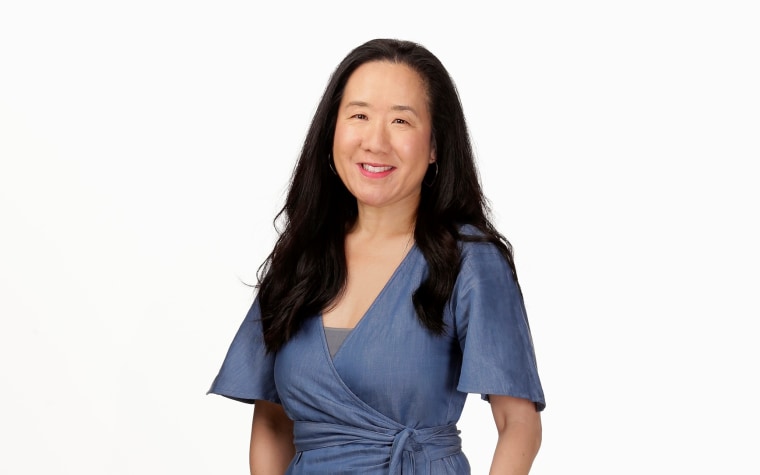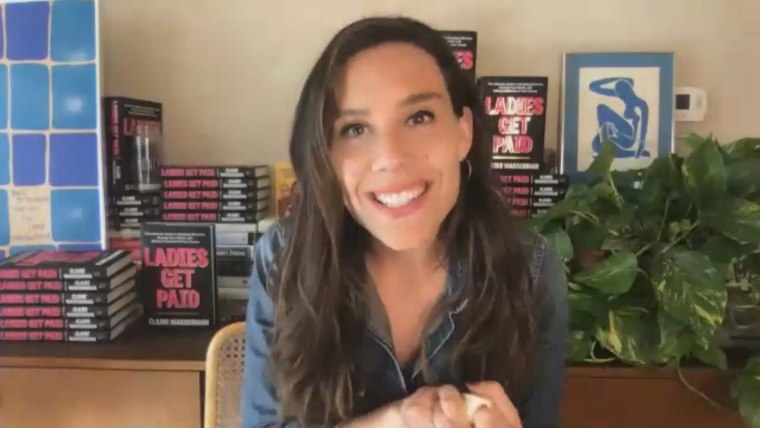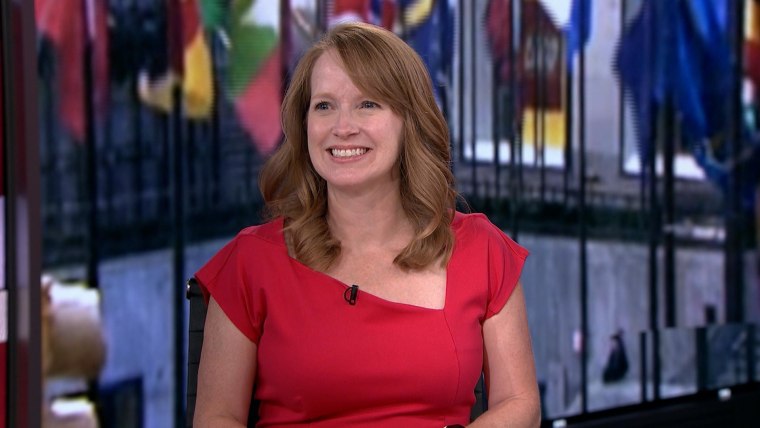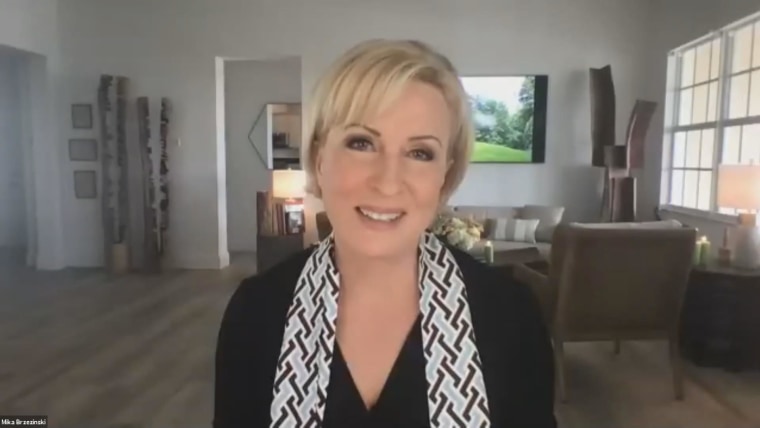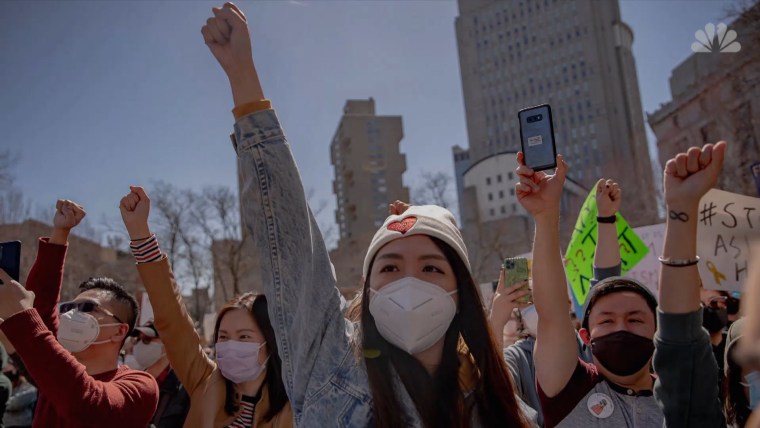As executive vice president of casting and entertainment content at NBCUniversal, Grace Wu has been at the forefront of hit shows, including “This Is Us,” “Friday Night Lights” and “Parenthood.” She’s also become known in the industry as a fierce advocate of greater diversity on our screens.
Wu started her career in television as a production assistant on Margaret Cho’s ABC series “All American Girl,” where she found mentors who encouraged her to consider a career in casting.
“Besides finding a career path, it was also exposure to seeing Asian Americans and Pacific Islander actors in lead roles every week” she told Know Your Value’s Mika Brzezinski. “… While I would not see another AAPI family show on broadcast TV for decades, I could at least see a path for myself in this business.”
Wu chatted with Brzezinski about her journey to the top of her field, where show now oversees casting and talent on broadcast network NBC and cable networks including Bravo, E!, Oxygen, USA, Universal Kids and more. Wu also gave her best advice for young women who are trying to find their passion, shared what it was like leading during a pandemic and more.
Here’s their conversation, which has been edited for brevity and clarity:
Mika Brzezinski: You’ve said in the past that you’ve had to figure out your career on your own. Can you tell us a little bit more about this? And do you have any advice for young women, who are trying to forge ahead in their careers, but don't have support or networks?
Grace Wu: I just really had this passion to work in entertainment, and I didn't know what it was going to be. I was fortunate enough to get a job as a production assistant on a television show [starring Margaret Cho] where I was able to see what everyone did. And I figured out that casting was what I wanted to do.
[Working on Cho’s show “All American Girl”] was such a watershed moment for me because as a young, Asian-American woman, I'd never seen an Asian-American family on television. So that was already just incredibly powerful.
…And I think for me, I was fortunate to have mentors in casting who really helped me, because my parents weren't in the business. I lived in L.A., and while I had a lot of friends whose families were in the business, and I had some exposure to what that could be like as a career, at home, they didn't have any sort of contacts for me. And I don't think they really understood it.
I'm a parent now, and I can reflect on how [parents] just want security, and they want you to be in a profession that they understand that will provide financial security and a future for you. And so, to them, [working in entertainment] was so vague and strange … But I didn't let that discourage me. And I just kept going …
Brzezinski: You’ve said it’s OK to not know what your passion is right away. I think a lot of young women are like, "I'm supposed to know. I'm supposed to be building towards something." I'm doing a Forbes 50 Over 50 list, interviewing women in their 50s, 60s, 70s and beyond who are finally hitting their stride. Young women have a long runway. What's your advice to help them not worry about what it is they want to do, but also find their passion?
Wu: Don’t be afraid to try new things. And frankly, when you try new things, you may have to start at the beginning, start at the bottom.
…I think part of it is being resilient, not being discouraged, and willing to put your ego aside to start and admit that you don't know things. And that took a while. When you get older, you just have more confidence and it's OK to just say, "You know what? I don't know. Can you explain that again?" Or asking questions. And I don't know if I was really comfortable doing that until I was probably in my 30s or 40s. I feel like I'm still learning so much and finding my voice and knowing that what I say has value, but also acknowledging that people have things to teach me …
Brzezinski: My next question is going to seem like a wild detour, but I actually think it's totally connected. You’ve said in the past that "My biggest accomplishment is picking the right guy to marry because I have created the family I've always wanted." I love this answer because I think a lot of women are so focused on their careers, and they're doing all this studying about how to know their value and communicate it effectively. But don't you think that getting married is also one of the biggest decisions that you will make in your life? And considering it your greatest accomplishment, I love that, because I say you have a long runway to find your passion. I think you also are allowed to have other facets of your life that are equally important to you.
Wu: 100 percent. And I feel like if I didn't have this partner and this family, I don't think the work would feel as valuable.
…My husband has always been such a partner and always very supportive and helpful with, frankly, managing our children, our childcare… He never made me feel guilty, because I traveled a lot for work when my kids were younger. He has a very demanding career too … But he's always been my advocate.
Brzezinski: I think you're sending an incredible and powerful message to women. I think a lot of women are scared to say, "I want to get married. I want to have a partner in life. I want to share this." And they have to put on a fierce front. And what you're telling us is you're not sure how you would do it without that facet of your life being fulfilled.
Let’s talk about advocating and speaking up for yourself. When you moved from freelance, to the network and you found your footing, how did you do with that? What did you learn about advocating for yourself?
Wu: It really just took time for me to find my voice. When I was working as a freelancer, I was very lucky to work in a busy, successful casting office where the work just came in. It was just incoming calls, like, “OK, we have this project.” So, I never really had to worry.
And when I shifted to the corporate world, I certainly had a very cordial relationship with my boss, but I really had to figure out how I would find my path and figure out how I was going to be a real advocate for talent on the network side …
I started going to a bunch of meetings, working with studios and casting directors, and it took me, to be honest, it probably took me a few years to really understand how my role could actually be helpful. When you're in a big company like this, it's the constant churn of work and there's such a volume and there's such a pacing of things that sometimes you don't feel like you have the chance to actually stop and think about what your contribution is going to be.
… I really attribute a lot of my success to [developing relationships with our writers and executives]. It took my ability to kind of connect and make connections with my colleagues and my peers so that I could be someone that they would feel like I was their partner, their champion, that we would help identify material and make things happen.
Brzezinski: That's awesome. I want to ask about being Asian American in entertainment casting. How is that? Because you were one of a few. Is there an issue with equity and inclusion that you would like to address?
Wu: Well, when I was first starting out, I certainly didn't see a lot of people like me in casting, or frankly, younger talent coming through. But in the last 20, 25, 30 years, I've seen so many more young Asian-American casting executives, talent at all the graduate programs … I don't know if I ever felt like I was diminished because of my race and ethnicity. But I also think that there were moments certainly yes, where I think people might've said things that they thought were jokes but were actually kind of attempts to just reduce me to a stereotype.
But my reaction to that was, I was always kind of dismissive of any sort of bias. Because I just always felt like, “Well, I'm not going to let that person or that remark be an obstacle for me to finish my work or even enjoy this meeting that I'm in.” I do have that ability to kind of erase or just kind of dismiss people that I think are negative or toxic or disrespectful because it's not going to help me.
…. I think Asian Americans in the workplace, because we're seen as hard workers and loyal, but maybe not always leaders. I think that's something that I probably had to overcome. But I do think about it, but I just try to then make my own impression and let people know that I'm not someone that can be dismissed or ignored.
Brzezinski: I'm curious, how did your job change during the pandemic? Or did you employ some skills that you never knew you had, or you don't usually use? Any extreme challenges or revelations about your job or your skills?
Wu: … The beginning of this pandemic, there was so much confusion and [figuring out] what this meant and working from home. Everyone was trying to figure out this crash course of how are we balancing home and work. I was honestly stressed and scared.
And I remember for the first week or so, I was just kind of paralyzed. I didn't really know what to do … And then I realized that we're all going through the same thing. We're all feeling the same kind of fear and insecurity. Let's all at least get on these Zooms together every day, including our assistants and let all of us just see each other's faces and just talk … be connected and share what's going on. I found that to be so empowering.
…And I would say the first couple months, I looked forward to these daily meetings that I had with my team, because they would go on for honestly, sometimes up to like 90 minutes, it would be on Zoom talking about our days, like "what are we going to do?" And "I'm afraid to leave the house. I don't know how to do the grocery shopping," things like that. But we just kind of all got through together. I'm very proud of that. Because I feel like that brought us all closer.
